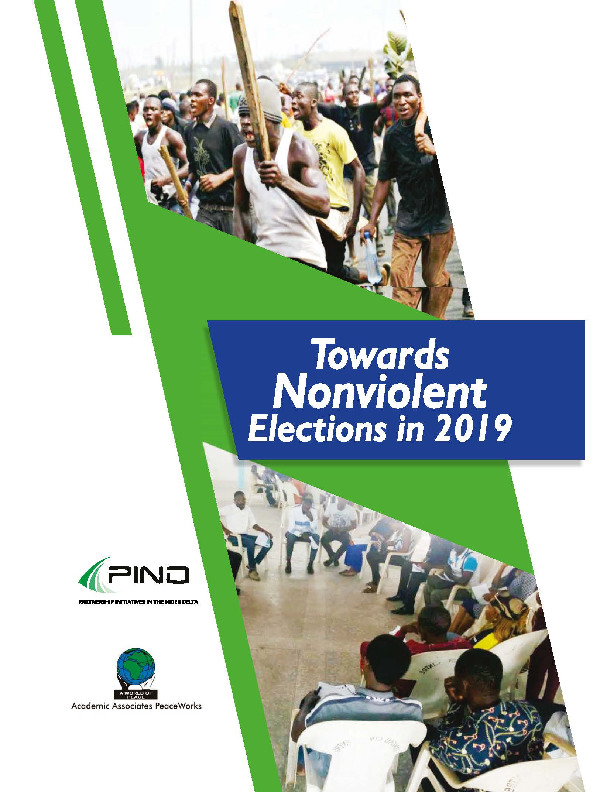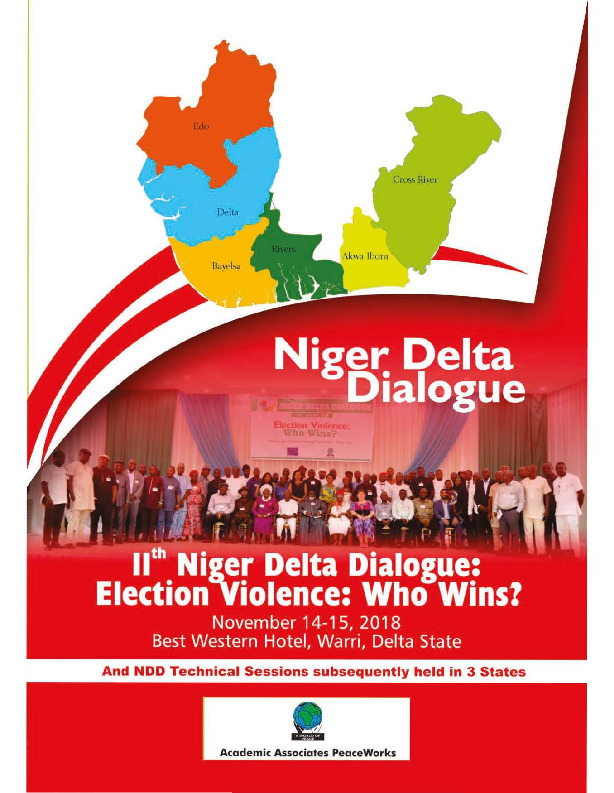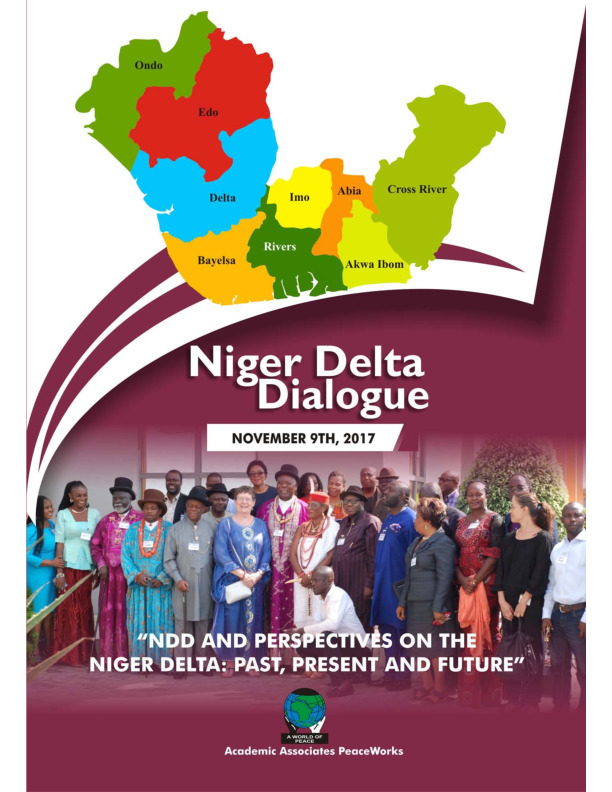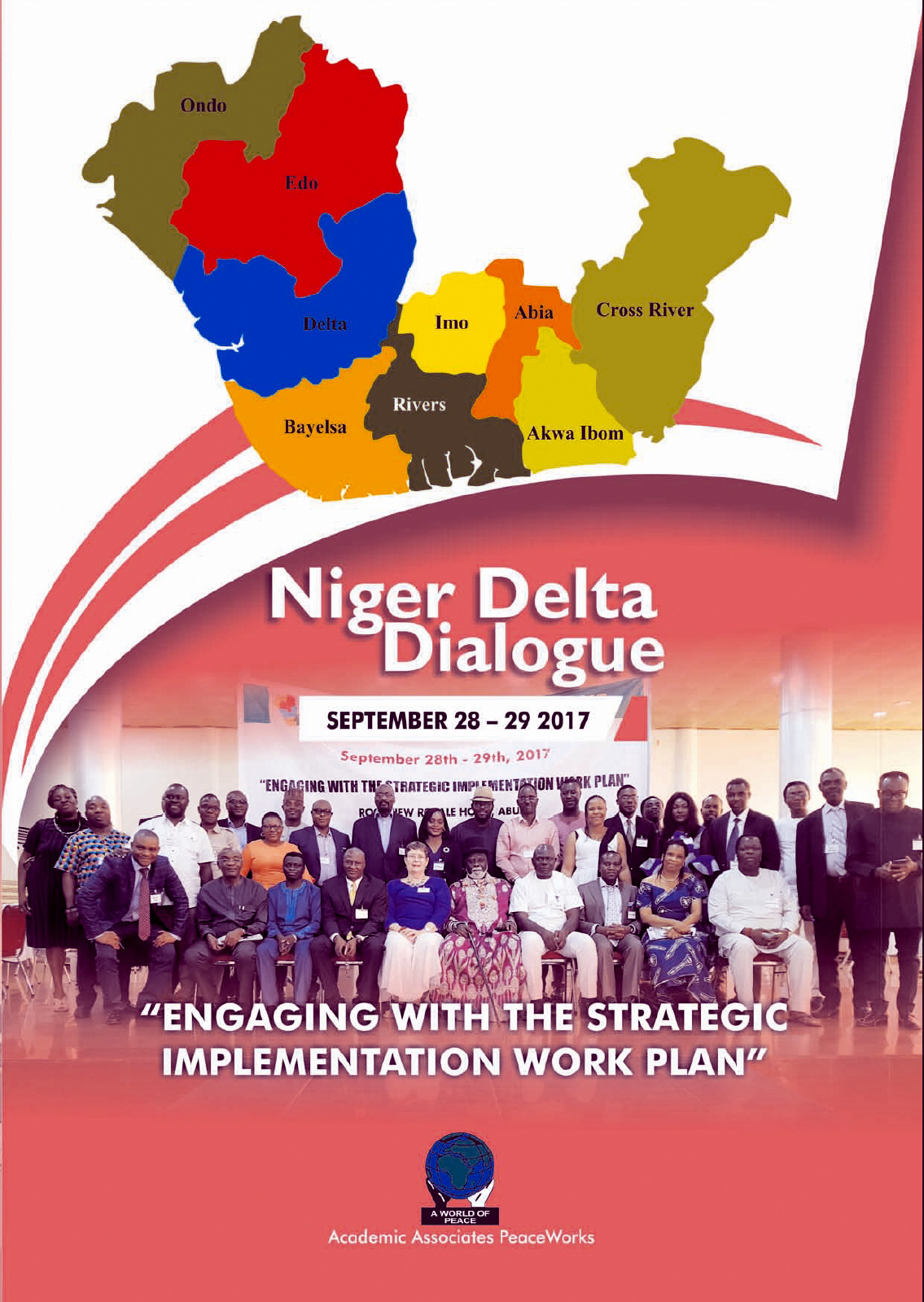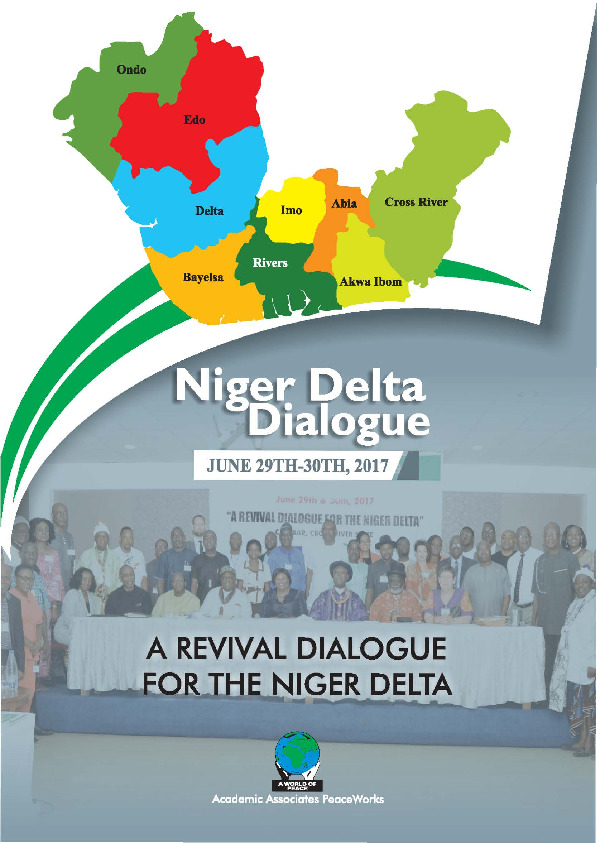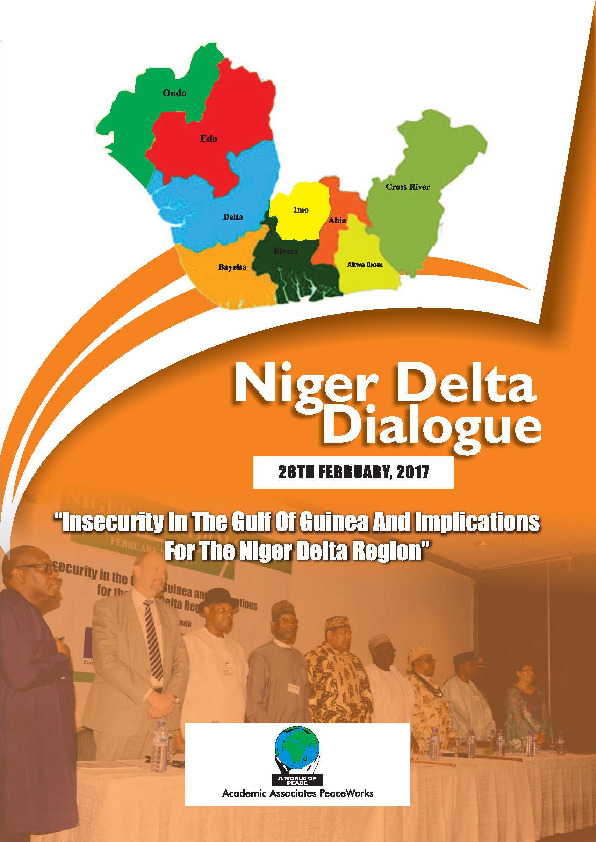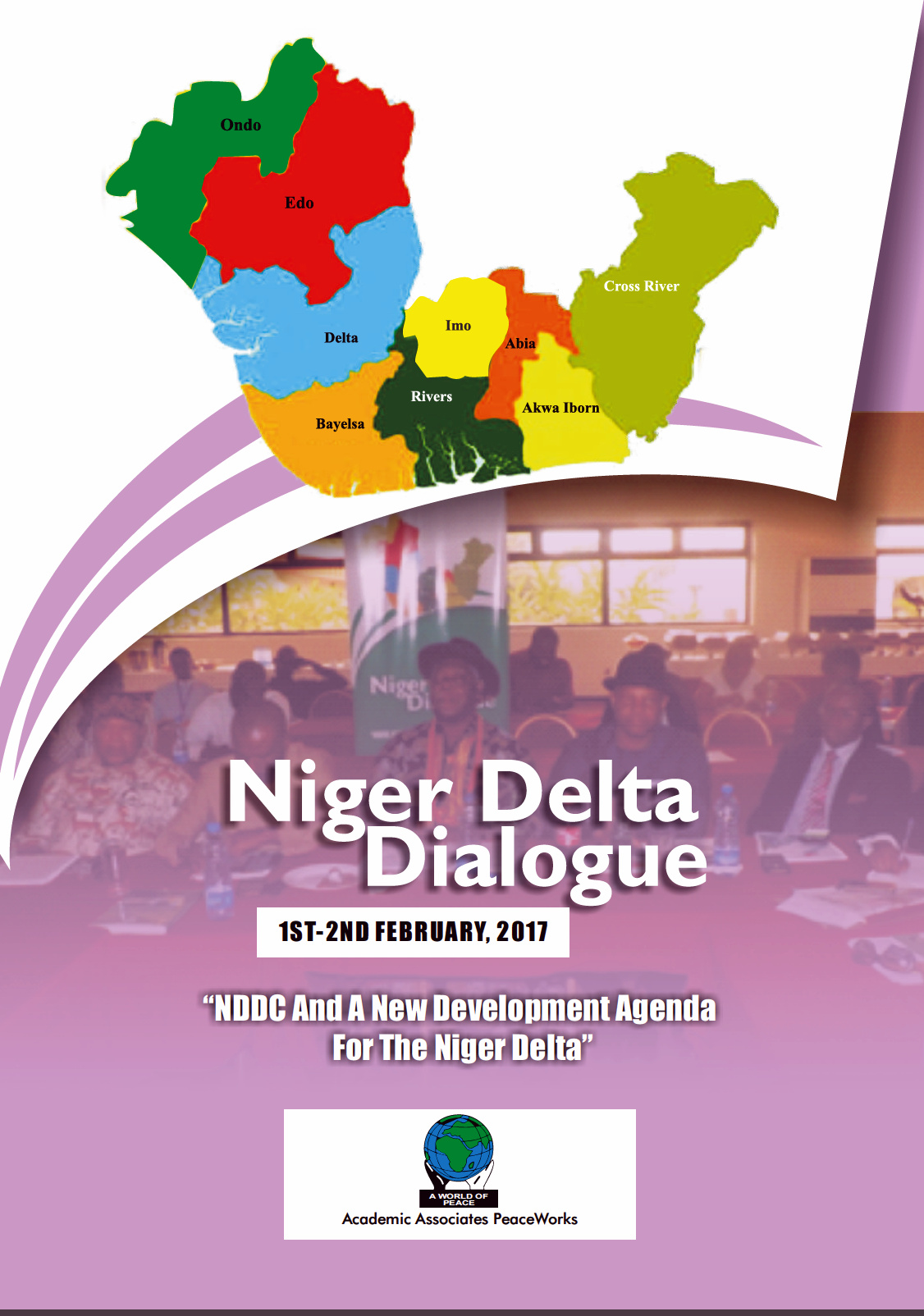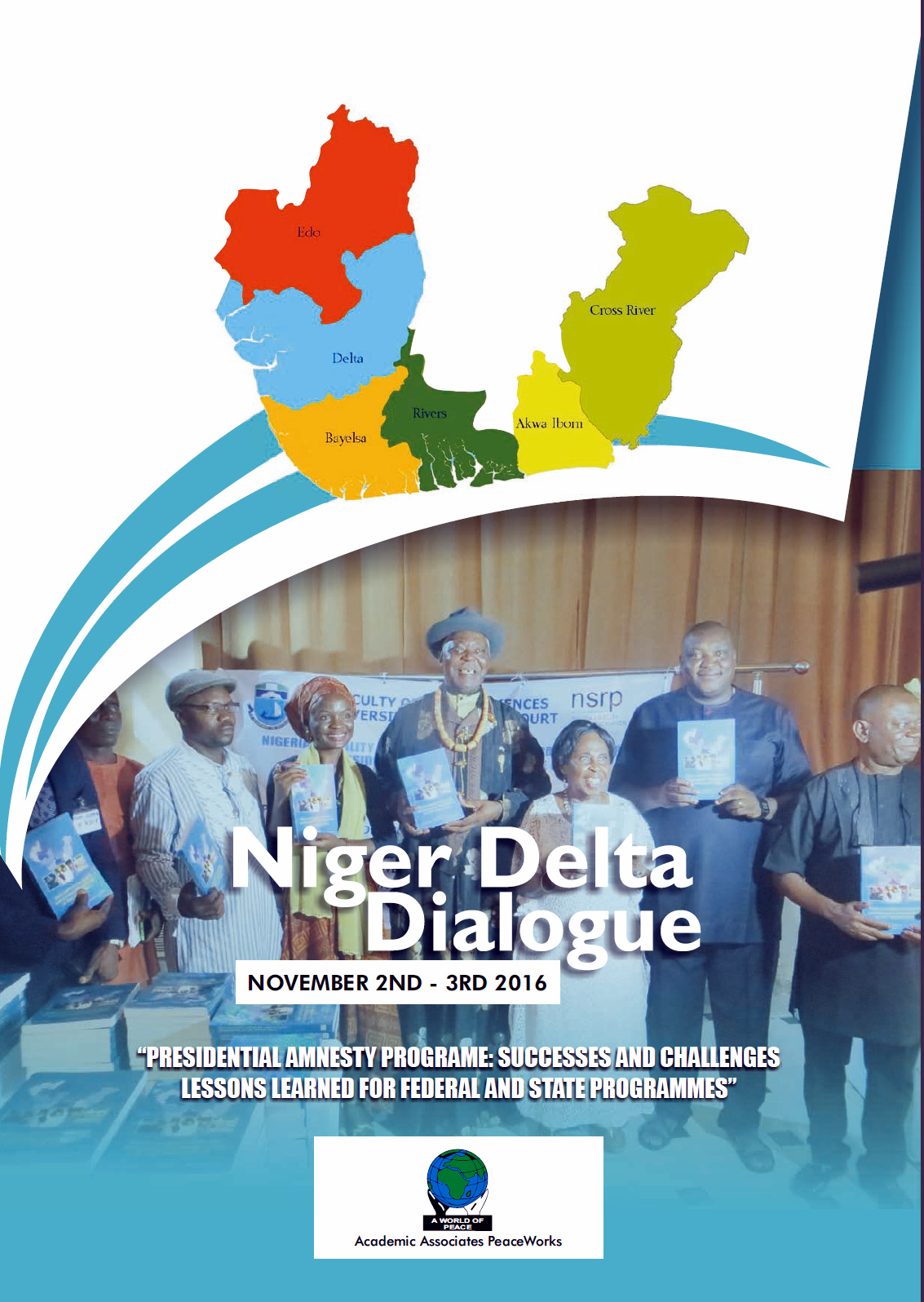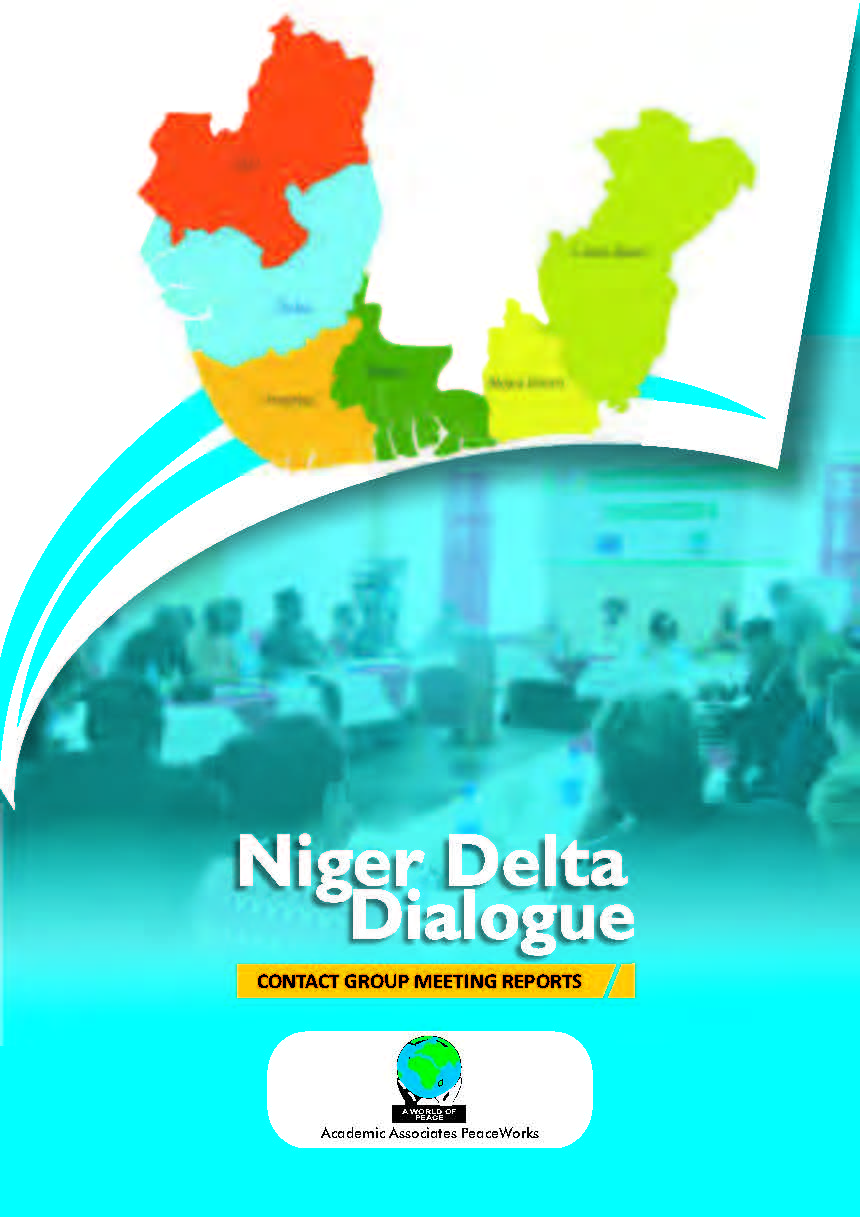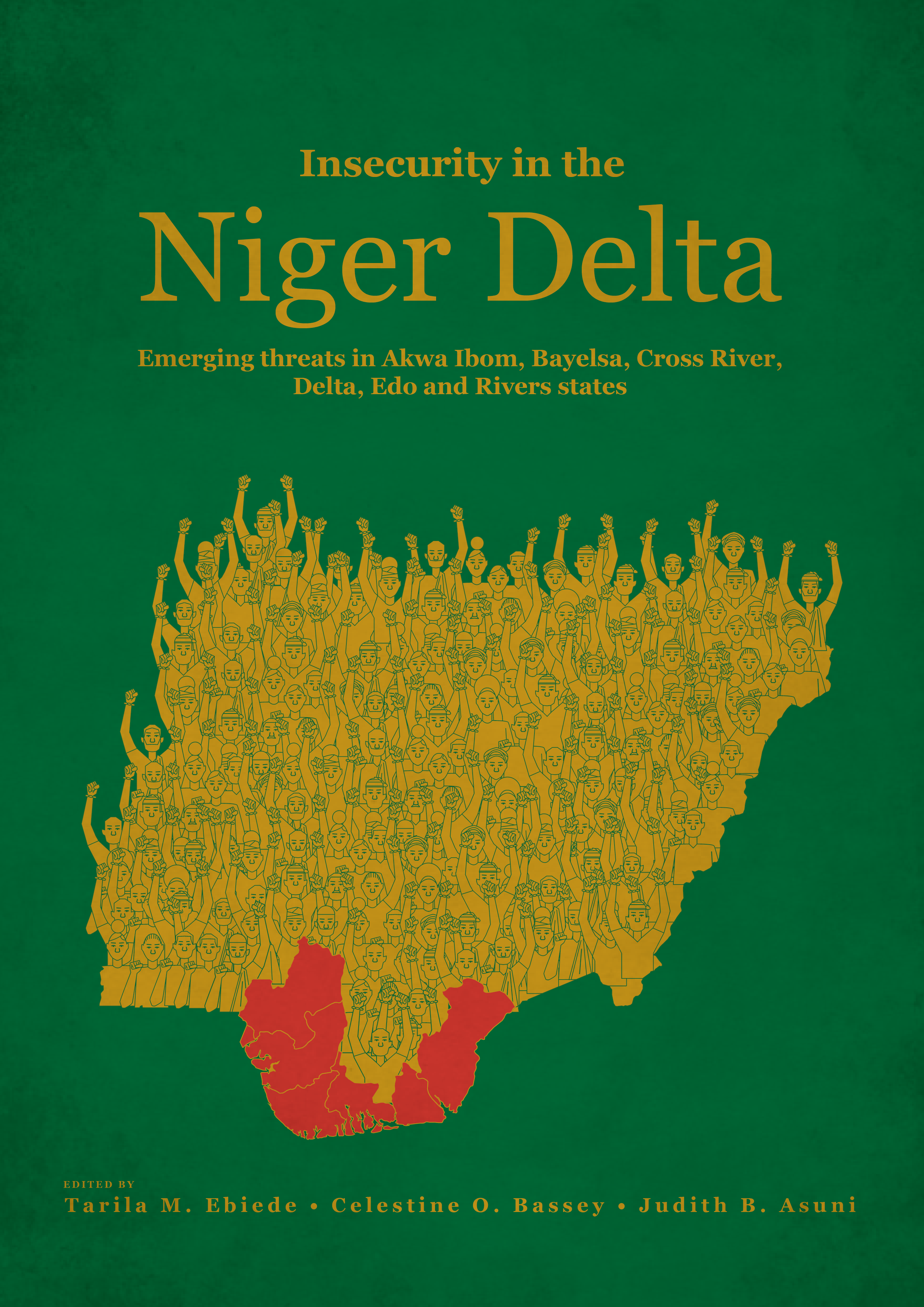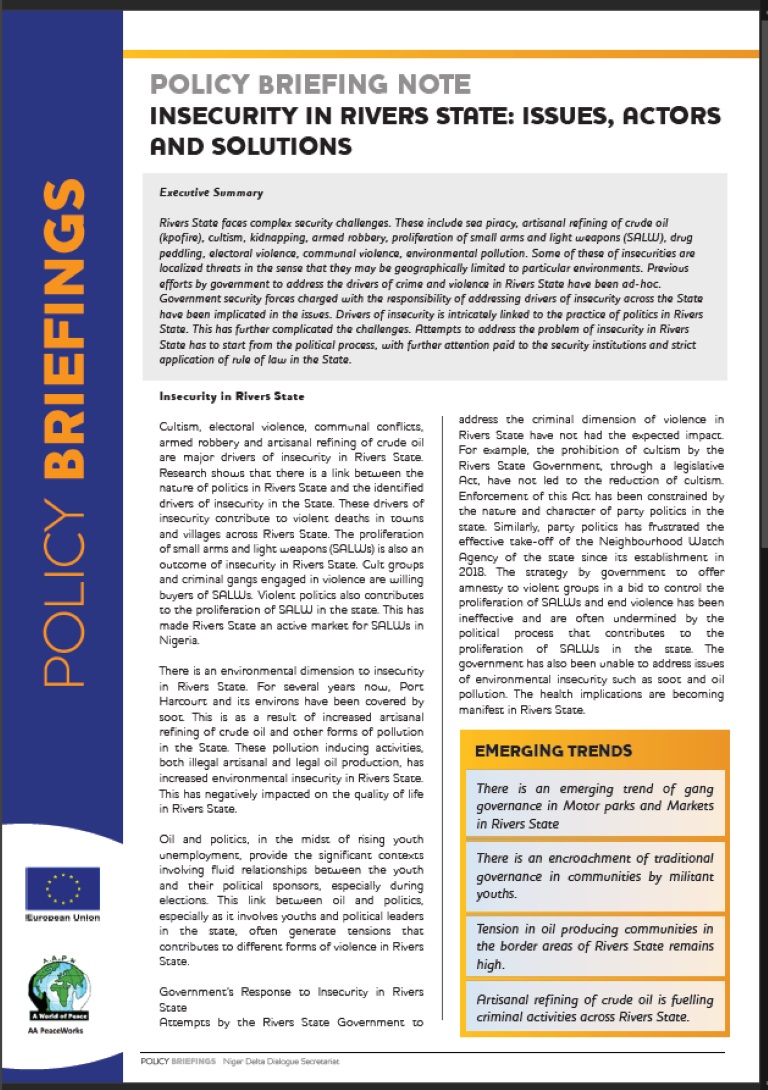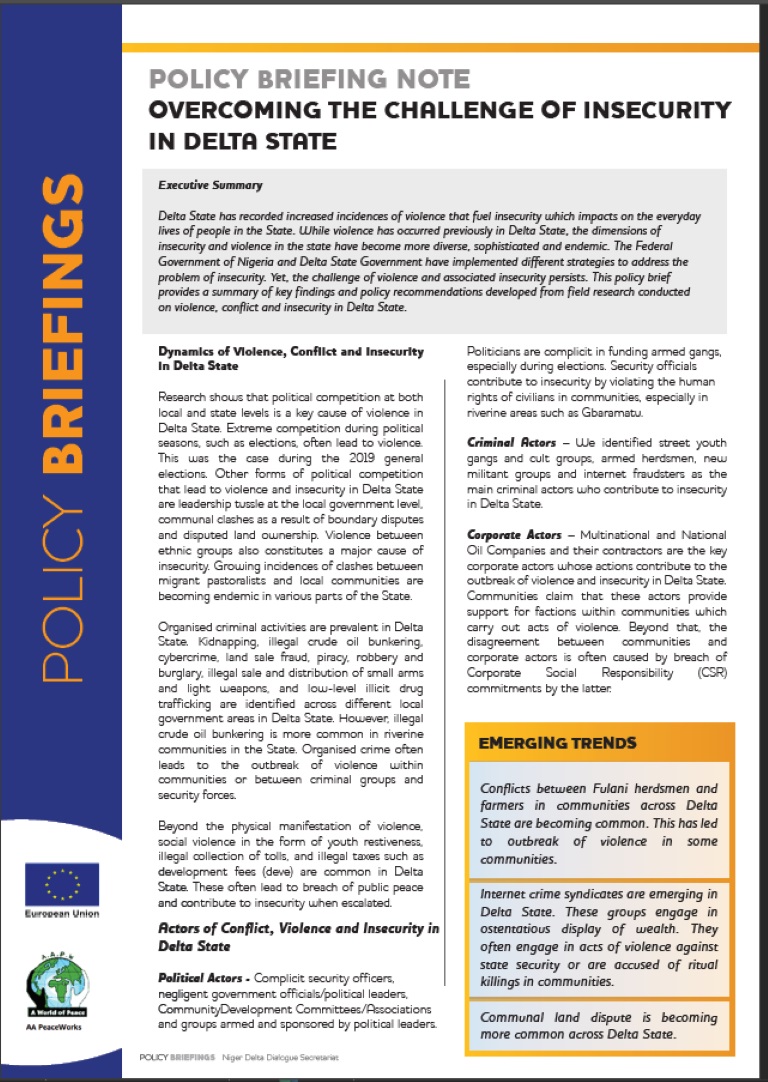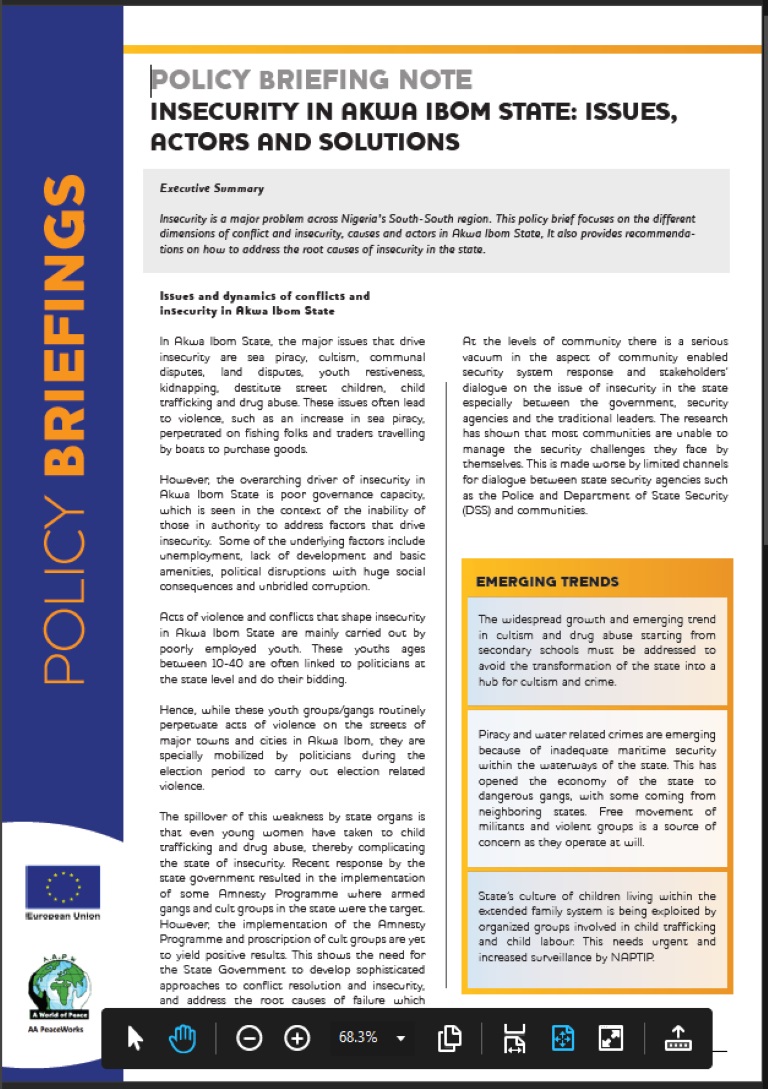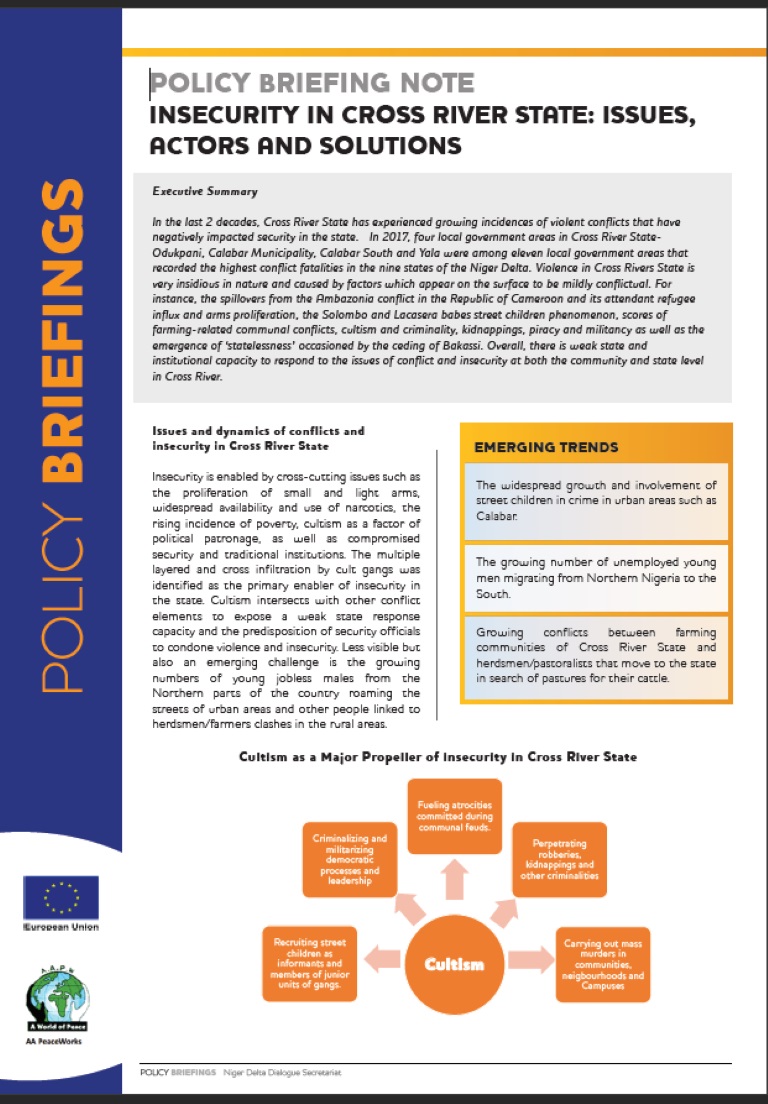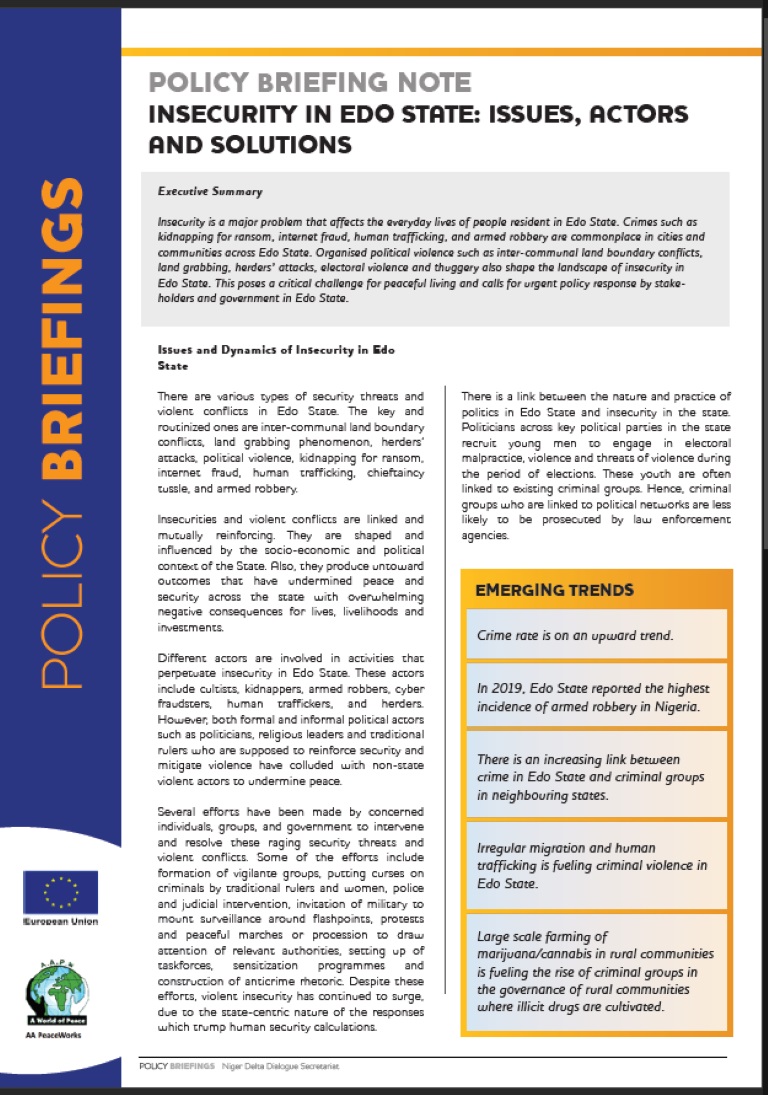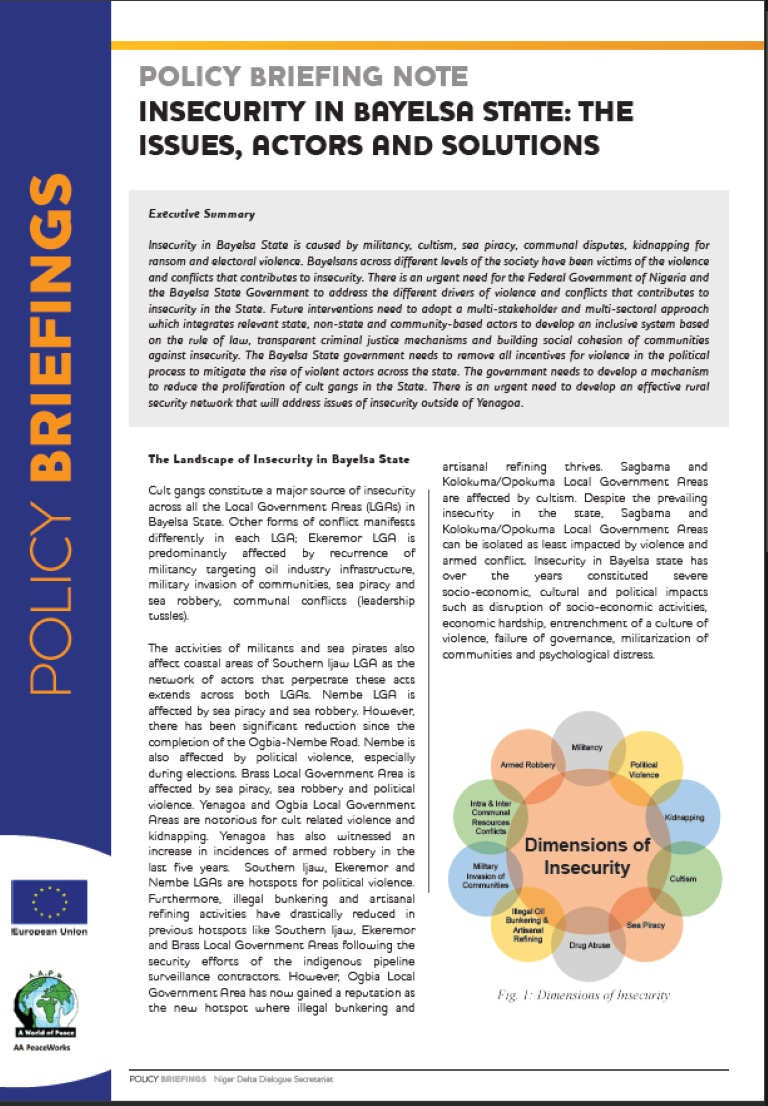2016 – 2021
Following the outbreak of renewed militancy involving the Niger Delta Avengers (NDA) in January 2016, Academic Associate PeaceWorks contacted the European Union (EU) for support to facilitate a dialogue between different stakeholders in the Niger Delta with the objective of stemming the recurrence of armed militancy in the region. It was in this context that the European Union (EU) provided a first one-off funding for the initial Niger Delta Dialogue (NDD) in June 2016 and a subsequent 9-month IcSP contract to Academic Associates PeaceWorks (AAPW) to implement the Niger Delta Dialogue (NDD). The support provided to the NDD was aimed to bring together critical stakeholders and leaders of the Niger Delta region in a discussion forum and to provide durable solutions to the Niger Delta crisis. Subsequently actors involved in the dialogue agreed that the process should continue. The European Union (EU) generously provided funding under the project titled “Stability and Conflict Management in the Niger Delta Region of Nigeria (SCM_NDR)”. In total the European Union funded the Niger Delta Dialogue for a 5-year period 2016-2021.
The General Objective
The intervention set out to achieve the following general objective:
- Contribute to the de-escalation of the conflict in the Niger Delta and return to stability in the region.
This general objective was further divided into the following specific objectives:
- SO1: Promote Constructive Advocacy/Influencing to contribute to Policy and Practice Changes for the Niger Delta region on key issues emerging from the dialogue sessions;
- SO2: Address the problem of insecurity in the Niger Delta through a research-based approach and engagement of local and state government institutions for pro-active action, including renewed discussions on the PANDEF 16 Point Agenda.
Specific Objectives
Furthermore, the outlined specific objectives aimed to achieve the outputs as outlined below.
Specific Objective 1: Promote Constructive Advocacy/Influencing to contribute to Policy and Practice Changes for the Niger Delta region on key issues emerging from the dialogue
Output 1.1: Hold a series of formal sessions of the Niger Delta Dialogue compounded with minor technical sessions, bringing together different stakeholders from the Government and the Niger Delta region
Output 1.2: Promote broad societal participation in the dialogue process and identify real time solutions to significant challenges emerging from the dialogue process.
Specific Objective 2: Address the problem of insecurity in the Niger Delta through a research-based approach and engagement of local and state government institutions for pro-active action, including renewed discussions on the PANDEF 16 Point Agenda.
Output 2.1: Strengthened participation of regional organizations to improve security action through social dialogues and to drive future development process facilitated by PANDEF and CSOs.
Output 2.2: Increased political will and regional commitment to influence the engagements of NDD process on insecurity.
The outputs were achieved by different activities such as the Niger Delta Dialogue meetings, constructive advocacy and influencing initiatives for police practice and changes, interface sessions between key state and non-state actors on security in the Niger Delta. Finally, the last iteration produced extensive studies of each of the 6 States of the Niger Delta and follow-up on the recommendations from the studies.
A series of 15 Niger Delta Dialogue large meetings were held over the 5-year period. Reports are attached here.
Niger Delta Dialogue Reports
- 1st Niger Delta Dialogue brought together key government and civil society stakeholders June 2026
- 2nd NDD determined an action plan for the group. July 2016
- 3rd NDD met with the emerging coastal group (later renamed PANDEF). September 2016
- 4th NDD presented the University of Port Harcourt study on amnesty. November 2016
- 5th NDD NDDC and a new development agenda. February 2017
- 6th NDD insecurity in the Gulf of Guinea. February 2017
- 7th NDD held a revival dialogue for the Niger Delta. June 2017
- 8th NDD focused on Niger Delta environment. September 2017
- 9th NDD engaged the Strategic Implementation Workplan. September 2017
- 10th NDD analyzed Perspectives on the Niger Delta: Past, Present and Future. November 2017
- 11th NDD examined the role of youth in reducing election violence November 2018
- 12th NDD focused on raising women’s voices in governance. April 2019
- 13th NDD zeroed in on nonviolent elections in Bayelsa. July 2019
- 14th NDD was on security pathway, attended by all senior police in the region, along with key civil society actors September 2019
- 15th NDD looked at the role of traditional rulers and security agents. January 2021
In addition, other meetings were held:
- Training of Nigeria Police in Bayelsa State on code of conduct
- A retreat for PANDEF to reflect on their activities, achievements and rethinking ways forward
- Election violence interventions were held in three states and a consolidating one with all the states in Port-Harcourt to review the effectiveness of the earlier interventions
- The meeting with all political parties in collaboration with the National Peace Committee that culminated in the Peace Accord in Bayelsa State that was signed by all the political parties.
- The state reports on Insecurity in the Niger Delta were presented at 6 state level Town Hall Meetings.
- 6 state level Peace and Advocacy Committees made advocacy visits to the 3 senatorial zones in each state to discuss issues of insecurity
- Media strategy workshop to develop a problem-solving strategy for media in the Niger Delta
- Webinar on fake news and fact checking
In the final phase of this project, the NDD focused on conducting extensive research and advocacy on insecurity in the Niger Delta. This led to the following activities:
- 6 State study on insecurity in the Niger Delta.
- Publication of an edited volume on Insecurity in the Niger Delta: Emerging Threats in Akwa Ibom, Bayelsa, Cross River, Delta, Edo and Rivers States.
- Publication of Policy Brief on Insecurity for each of the 6 Niger Delta States.
- Formation of the Policy Advocacy Committees (PACs).
- Advocacy visits of the PACs to state political authority responsible for implementation of some of the key findings of the research on insecurity. and public meetings in the various senatorial zones
- Extensive documentary and discussion series on the Niger Delta on AIT television.
- Extensive support to key organisations in the Niger Delta such as PANDEF.
Insecurity in the Niger Delta
The various activities of this project have continued to promote social inclusion by ensuring the participation of women and youth, as well as working with PANDEF, the leadership forum of representatives from most segments of the Niger Delta. The NDD has ensured that special attention is paid to women by dedicating special activities to engage them during the 12th and 13th NDD processes, which increased the numbers of engaged women to 93 and 48 respectively unlike the previous NDDs. This was a far cry from the 11th NDD that had 66 men and 10 women, as the emphasis was on youth who can be used for election violence and such youth are mainly male. All four NDDs that held with six smaller meetings had 30% of women as participants. Some of these activities mobilised support for the inclusive participation of women in governance, through the creation of networks to amplify their voices during the 2019 presidential and gubernatorial elections in the region. Also, the facilitation of shared learning experience for one hundred (100) women in Bayelsa and Rivers states respectively drew women from all over the Niger Delta region.
Policy Briefs
During the 11th NDD, youths were also engaged to ensure their involvement in decisions that affect them through the following activities:
- Sensitizing youth leaders of thirty ethnic groups from across the six Niger Delta states on the role of youths in reducing election violence in the region;
- Follow-up sessions of the above in three states (Delta, Akwa Ibom and Rivers) to identify strong links to electoral violence and increasing two hundred and ten (210) youths’ resilience in addressing them; and
- A review meeting of thirty (30) youths to assess to what extent the two (2) activities above were effective with the knowledge acquired and the ways they were delivered to trigger change in attitude.
Also, involving all relevant stakeholders in the series of dialogue processes ensured social inclusion, especially working with persons from thirty ethnic nationalities from the region.
A key outcome of the Niger Delta Dialogues was the promotion of a series of formal sessions compounded with six smaller sessions with different stakeholders from the government in the region. These dialogues have ensured on-going discussions, which is very important, because communication breakdown could lead to renewed violence, and these dialogues have prevented a relapse into violence as the participants continue to reach meaningful agreements.
Again, paying special attention to women and youths has contributed to the de-escalation of the conflicts in the Niger Delta, by reducing the number of incidences of electoral and other forms of violence in the region.
Engaging with the Police in the 14th NDD is also yielding positive results, as the police is beginning to acknowledge and utilize the support of civil society groups in achieving their goals, and civil society is also feeling freer to report incidences to the police because of the new confidence built. Cooperation with INEC has also been built and top INEC officials have regularly participated in our events. In fact, the INEC chairman himself instructed his national commissioner and state REC to cooperate with us, after receiving our reports on the off cycle Bayelsa elections. The army, navy, DSS and Civil Defence always send representatives to our meetings. The Ministry of Niger Delta also participates regularly. Also, the Special Advisor to the Niger Delta has been an active participant in our meetings. He asked for our assistance with his portfolio of Beyond Oil. This is an indication of how this project is contributing to policy change in the Niger Delta. It is an example of governmental institutions addressing existing/current problems. Unfortunately, due to the Covid-19 pandemic the SA’s proposed meeting on Beyond Oil could not hold.
The 13th NDD on nonviolent elections in Bayelsa brought candidates, civil society, and security agents to work together and that led to the signing of a Peace Accord by the major political parties with resultant reduced violence during the elections.
Study on Insecurity in the Niger Delta
A key result of NDD’s research and advocacy is the large-scale study on insecurity in six Niger Delta states which led to the publication of the report titled “Insecurity in the Niger Delta: A Report on Emerging Threats in Akwa Ibom, Bayelsa, Cross River, Delta, Edo and Rivers States”. The report is published internationally by Adonis & Abbey Publishers Ltd, London, United Kingdom, and made available locally in Nigeria and online by Academic Associates PeaceWorks (aapw.org). The production of the book involved 14 researchers from 6 states in the Niger Delta. The researchers engaged stakeholders in identifying issues of insecurity in their respective states. These included traditional rulers, public office holders, civil society organizations, security agencies and everyday people, in generating qualitative data that can be used to map out and explain the problem of insecurity in the Niger Delta. Copies of the publication were distributed to all federal security agencies, 6 state governors and relevant agencies, international partners, universities both in Nigeria and abroad, key stakeholders. A webinar was organized by the publisher, as was a webinar by American University in Washington, DC. Also, the Nigerian Institute of International Affairs hosted a seminar where 2 of the book editors presented the findings and a lively debate ensued.
The research was mapped out in a workshop in March 2020, with the research conducted in April- June. Each state report was presented at a state level Town Hall Meeting between July and September, where research findings were discussed and validated. Covid protocols were strictly observed. At these meetings, researchers responsible for each state presented their reports to a gathering made up of critical stakeholders in security sector, traditional rulers, youth groups, and state level officials. The gatherings achieved two overarching purposes. First, they acted as validation workshops for the results of the research. Participants, drawn from different levels of society, made inputs into the research papers at these state levels meeting, engaging directly with the researchers and providing further evidence to support or modify the reports. In some instances, participants also identified issues of insecurity important to them that were not captured in the research. Hence, as a result of the six meetings, the final research report is robust and provides a comprehensive picture of insecurity in the Niger Delta. Second, the meetings also acted as a sensitization workshop on insecurity in the Niger Delta. While most participants already have extensive knowledge of insecurity in their communities, the capacity to act in synergy with other stakeholders was not a common trend.
An unexpected result of the state Town Hall Meetings was the formation of 8-10-member Policy Advocacy Committees (PACs) in each state, which were able to identify synergies among themselves and set an agenda for advocacy on insecurity in their respective states. The Policy Advocacy Committees, along with PANDEF representatives, were trained in Strategic Communication and each state developed an action plan. The PACs were able to conduct advocacy meetings, targeting state government officials and security institutions in their respective states. For example, the PAC in Bayelsa State had a meeting with the newly elected Governor of the State where the research on insecurity in Bayelsa was presented to him. The Governor made commitments to work with relevant security agencies to find long lasting solutions to the findings in the research report. Similar successes were recorded in other states such as Akwa Ibom and Cross River where the PAC is made up of people actively involved in local politics and as such are able to mobilise advocacy meetings with key actors in their respective states. Rivers PAC has a retired rear admiral and head of Neighbourhood Watch as co-chairmen, who have access to top security officials. The chairman of the Delta PAC is a very senior adviser to the governor and head of the peacebuilding department. The Akwa Ibom PAC was especially effective in visiting each senatorial zone, first on enlightenment visits about the insecurity report, and again later to meet with traditional rulers and clan heads to discuss how they can work effectively with other key parties.
At the end of the insecurity study, a large meeting of prominent traditional rulers and heads of security institutions in the six Niger Delta states was convened on 28th January 2021 at Hotel Presidential, Port Harcourt. The meeting had in attendance key Traditional Rulers from Akwa Ibom, Bayelsa, Cross River, Delta, Edo and Rivers State. This meeting, which was held under strict adherence to COVID-19 protocol, including on-site testing of participants and social distancing, attracted key heads of security institutions in the 6 Niger Delta States including the Commissioner of Police of Cross Rivers State, representatives of the Commissioners of Police in 5 other states and representatives of the Department of State Security (DSS) in these states. Participants at the meeting had an extensive exchange on collaborative mechanisms to address insecurity in the Niger Delta. Participants focused on building synergies between traditional rulers and security institutions, with the objective of ensuring that traditional rulers play a more vital role in the provision of security in their domain.
Evaluation
Despite the challenges of the Covid 19 period which prevented the European Union from conducting a formal evaluation of the Niger Delta Dialogue, the NDD engaged an external consultant to collect feedback from key beneficiaries involved in the Niger Delta Dialogue. These beneficiaries include members of PANDEF, Youth Groups, Traditional Rulers, Journalists, long-term members of NDD, other CSOs, and Members of Policy Advocacy Committees (PACs) in the Niger Delta. The feedback received are outlined as follows:
- The NDD dialogue has been able to give neglected stakeholders a voice on issues of insecurity in the Niger Delta. This has made such actors to recognise their agency in security governance and are seeking ways of expressing this agency in the security of their communities.
- The NDD has created a platform that allows different stakeholders work together in the Niger Delta. While there are competing interests in the Niger Delta, the NDD provided a platform to reconcile these interests and present a common position on issues concerning security and development in the Niger Delta.
- The NDD has ensured that issues related to the Niger Delta remain part of the national conversation in Nigeria. For stakeholders, this is important as competing issues in Nigeria, which include insecurity in the North East and Nigeria’s fragile political situation, can easily suppress relevant information from marginalised regions such as the Niger Delta. However, with the implementation of the NDD, especially the media outreach and advocacy, issues of the Niger Delta remained on the national conversation.
Publications and Products of the Niger Delta Dialogue
Meeting reports, policy brief and educational materials were printed and widely distributed. Many are found on this website. The AIT Television multi part video series is also available. All materials may be freely quoted if acknowledgement is made of the Niger Delta Dialogue and European Union support.
Publications of the Niger Delta Dialogue
| Item | Name | Date | Number of copies |
| NDD reports of the 15 large Dialogues | see individual reports | 400 | |
| PANDEF retreat report | PANDEF National Leadership Retreat | October 2019 | 300 |
| Police code | November 2019 | 100 | |
| Problem solving media strategy | Media Strategy for the Niger Delta | July 2020 | |
| 6 state reports on insecurity | Insecurity in the South-South States: Issues, Actors and Solutions Akwa Ibom State Cross River Bayelsa Edo Rivers Delta | June 2020 July 2020 July 2020 July 2020 August 2020 September 2020 | 100 each |
| State Policy Briefing Notes | Akwa Ibom Cross River Bayelsa Edo Rivers Delta | August 2020 August 2020 August 2020 August 2020 September 2020 October 2020 | 150 150 150 150 150 250 |
| Guidelines for PACs | August 2020 | 90 | |
| Amnesty report | What the Militants Say | August 2020 | 300 |
| Amnesty policy brief | Outcomes of the Presidential Amnesty Programme (PAP) in Oil Rich Niger Delta | August 2020 | 300 |
| Videos from 7 part television series | December 2020 | online | |
| Summary television video | January 2021 | online | |
| Strategic Communications presentations | August 2020 | 50 | |
| Strategic Communications presentations | December 2020 | 50 | |
| Published report (454 pages) | Insecurity in the Niger Delta | January 2021 | 300 |



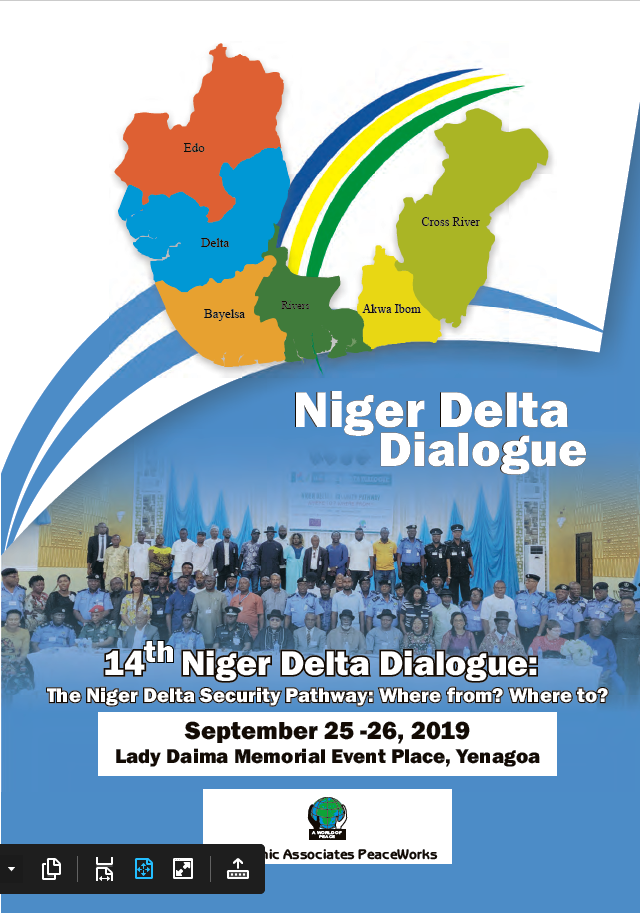
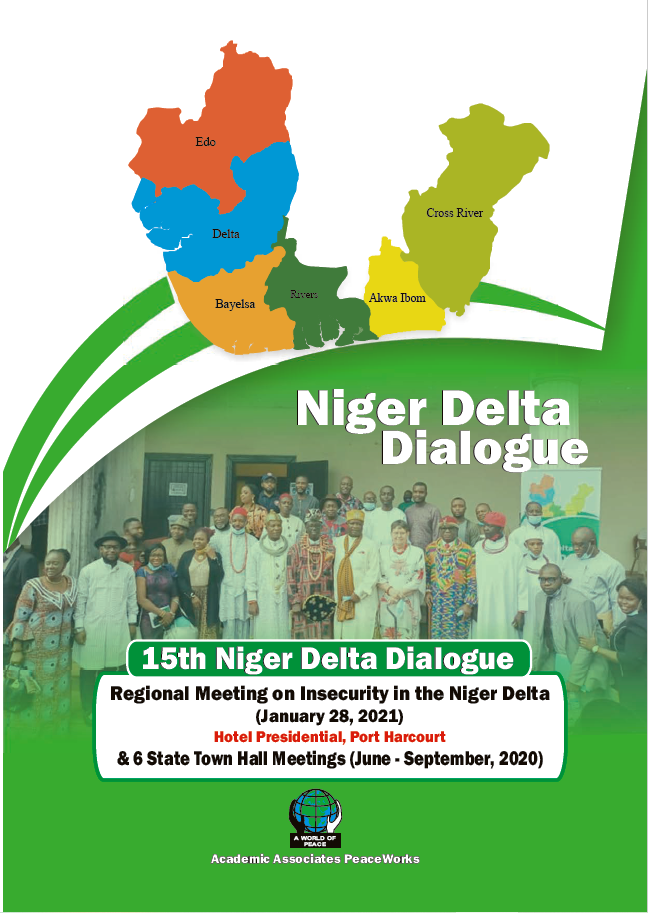
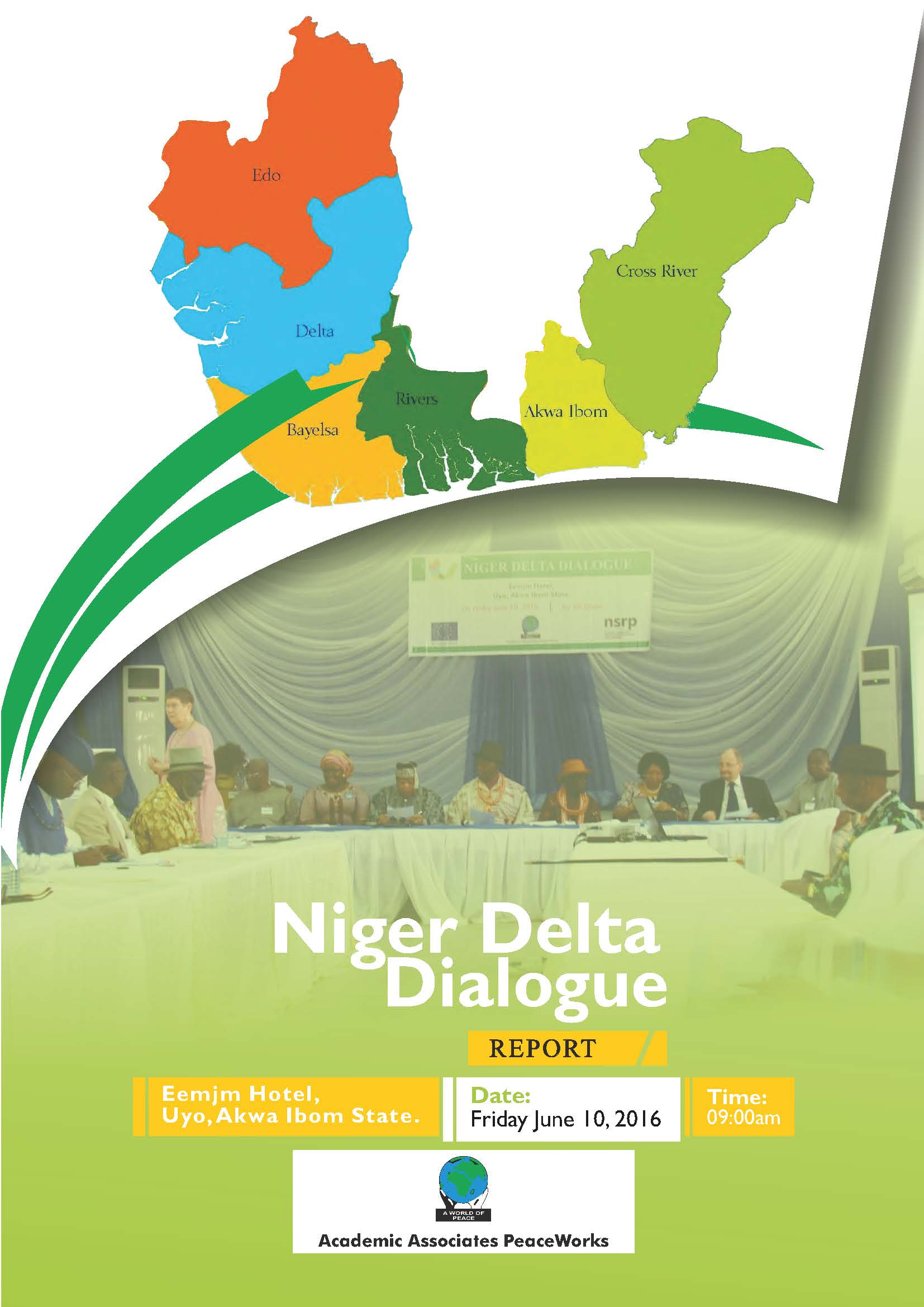
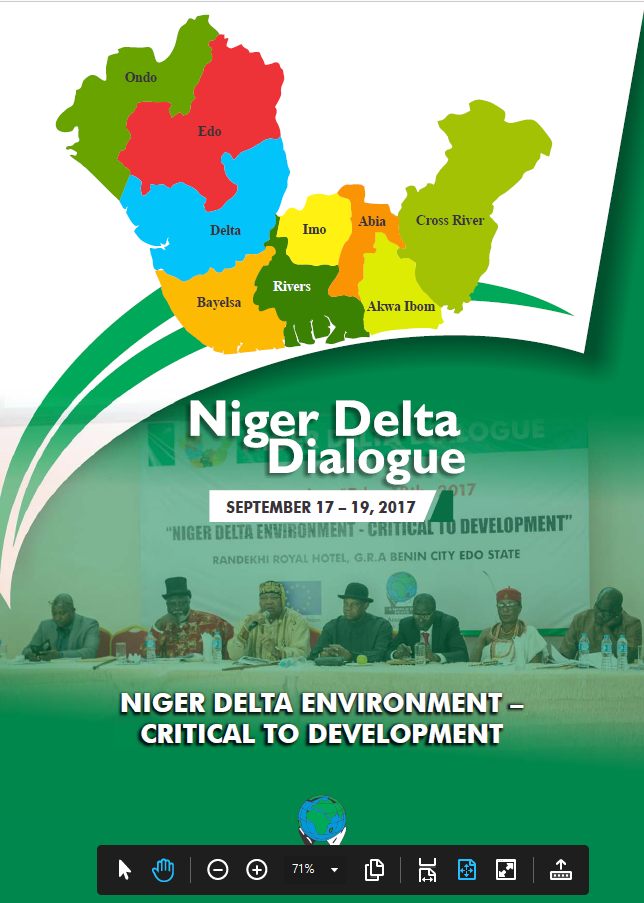
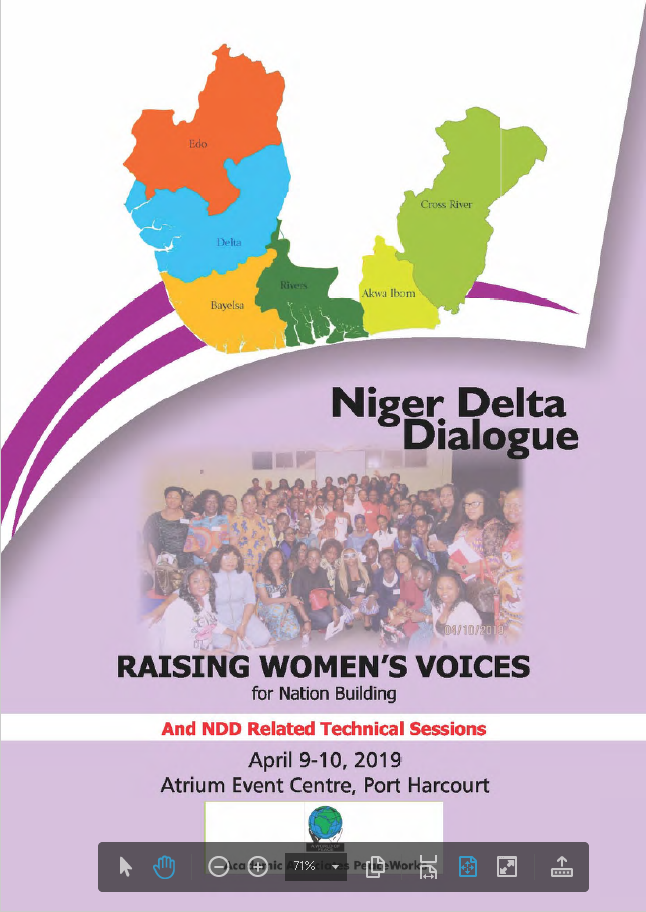 12th-NDD-womens-voices-report
12th-NDD-womens-voices-report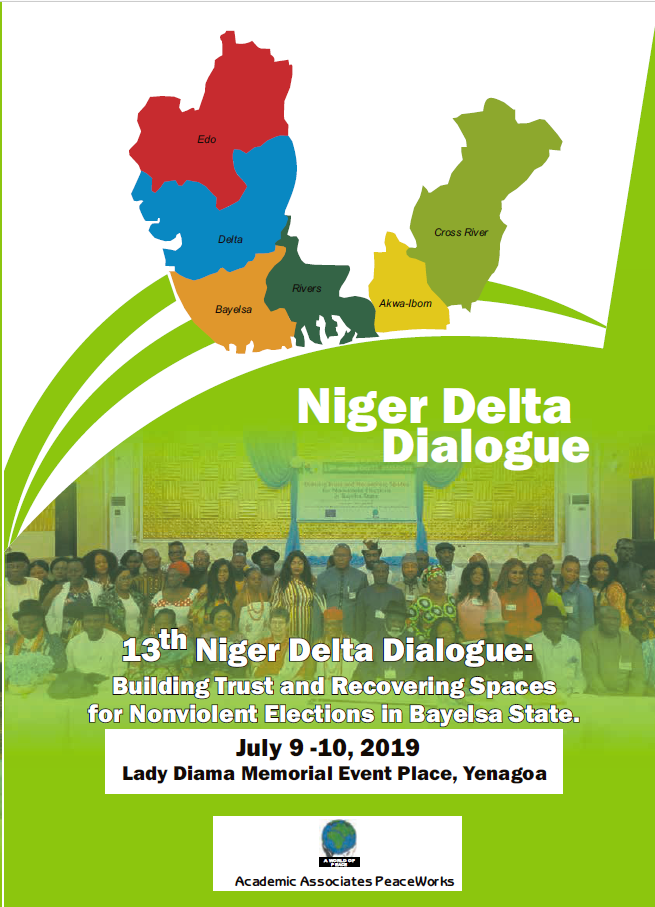 13th NDD Bayelsa election
13th NDD Bayelsa election